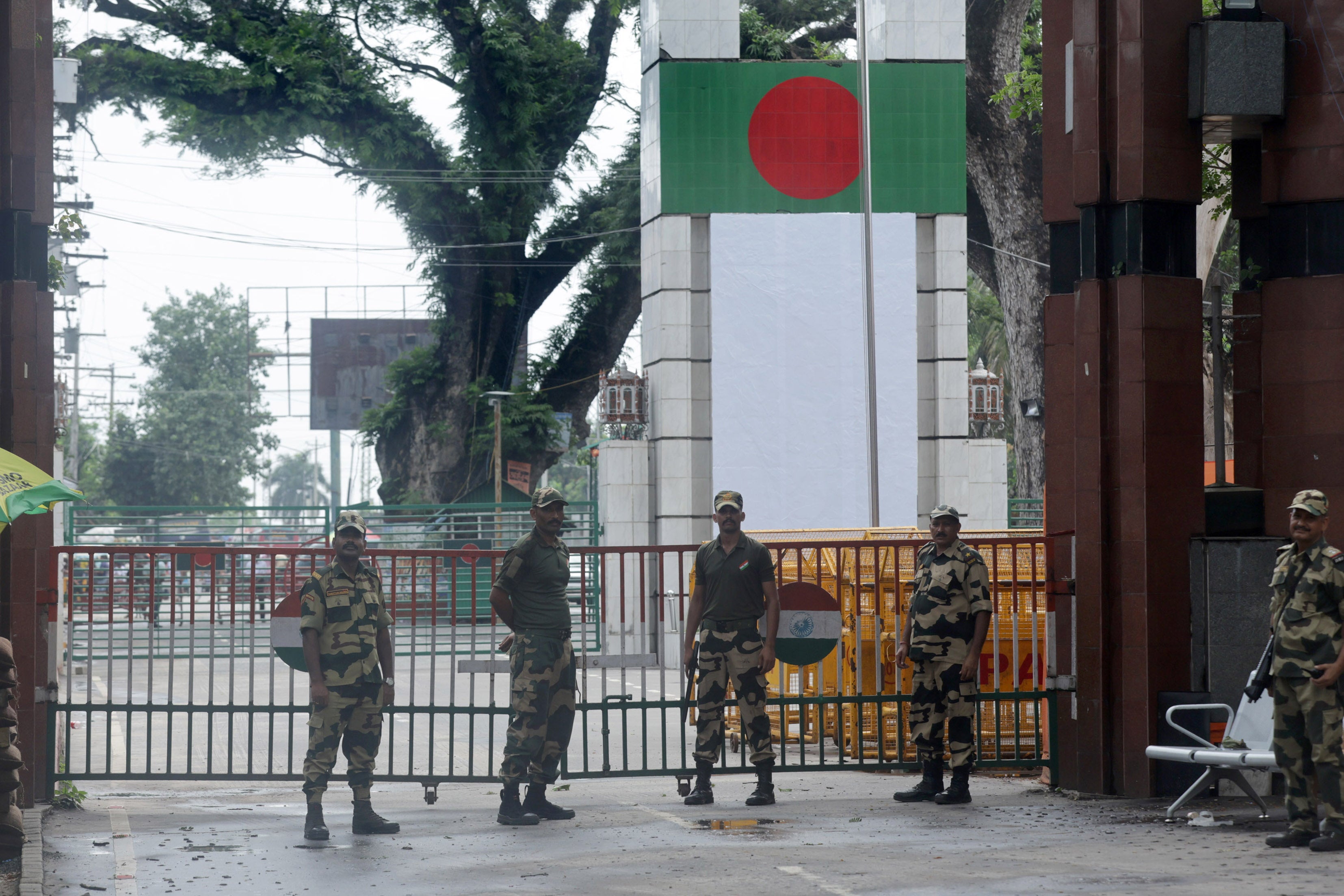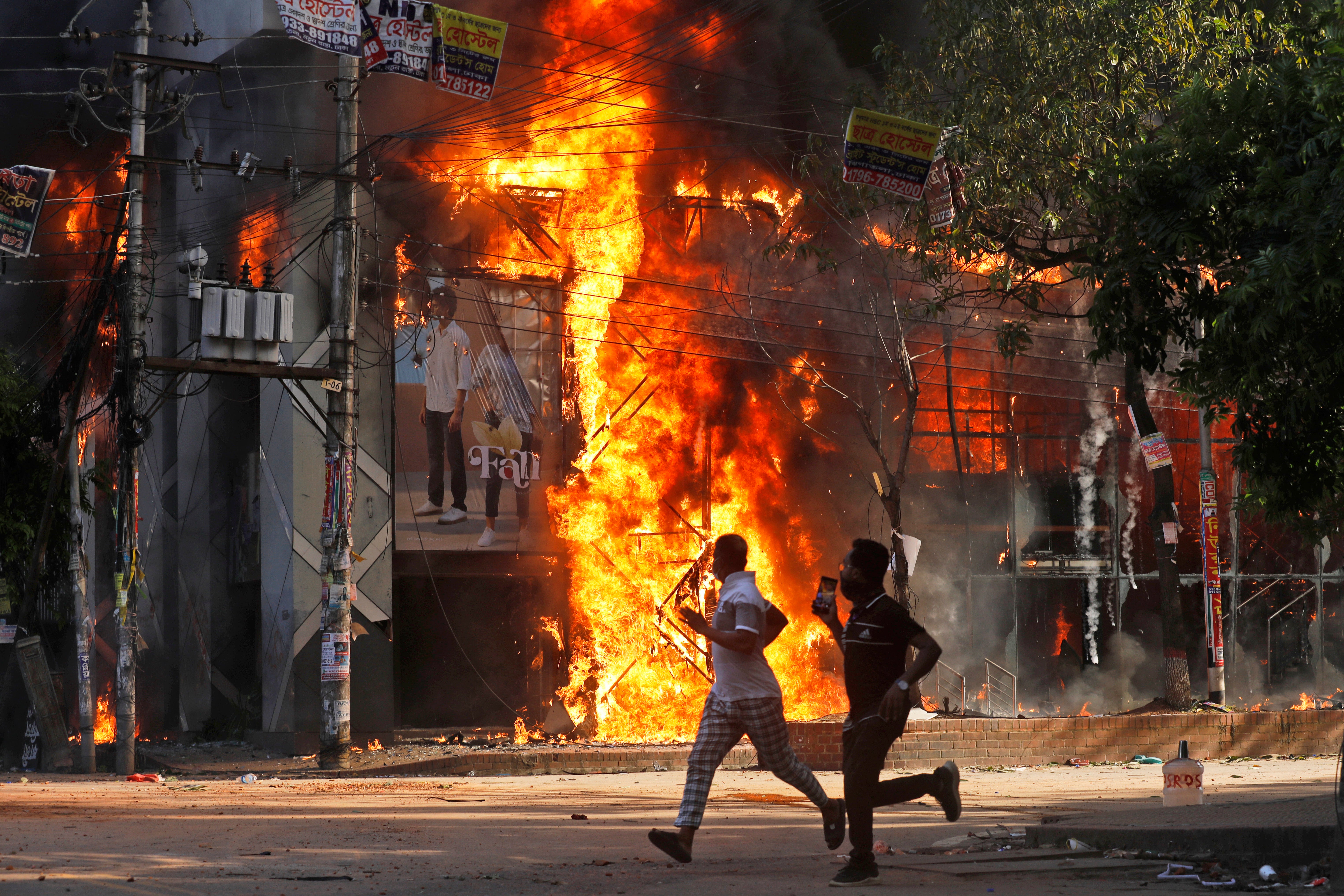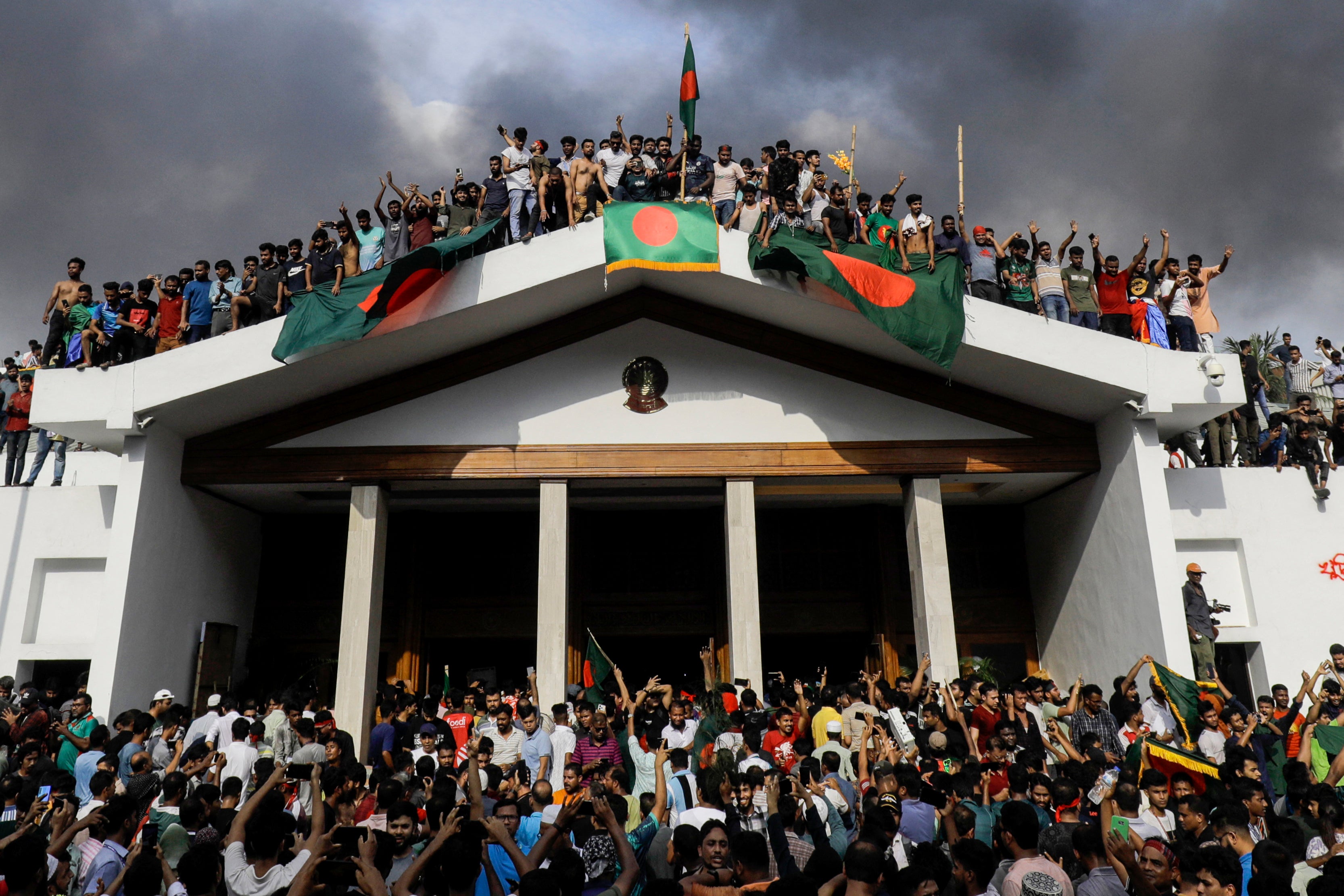Fear of persecution pushes Bangladeshi Hindus to flee to India: ‘How long before radicals take over?’
Alisha Rahaman Sarkar reports from the Haridaspur border post between India and Bangladesh, where security has been tightened amid a rush of people fleeing the ongoing violence following Sheikh Hasina’s resignation

Your support helps us to tell the story
From reproductive rights to climate change to Big Tech, The Independent is on the ground when the story is developing. Whether it's investigating the financials of Elon Musk's pro-Trump PAC or producing our latest documentary, 'The A Word', which shines a light on the American women fighting for reproductive rights, we know how important it is to parse out the facts from the messaging.
At such a critical moment in US history, we need reporters on the ground. Your donation allows us to keep sending journalists to speak to both sides of the story.
The Independent is trusted by Americans across the entire political spectrum. And unlike many other quality news outlets, we choose not to lock Americans out of our reporting and analysis with paywalls. We believe quality journalism should be available to everyone, paid for by those who can afford it.
Your support makes all the difference.There is visible relief on the faces of passengers aboard the buses from Bangladesh as they are waved through into India’s Haridaspur by border guards, some heaving sighs of relief as others break down into tears over the violence and arson they have left behind.
South Asia’s largest land port was crowded on Thursday with anxious people waiting on both sides of the border between India and Bangladesh, a country thrust into uncertainty by the dramatic resignation of long-time leader Sheikh Hasina earlier in the week.
“I ran,” says Sheeba Pal*, 46, after arriving at Haridaspur, about 83km from the eastern city of Kolkata, following days of targeted attacks on members of the Hindu religious minority in the wake of the mass uprising against the prime minister.
While Pal made it out on an existing visa, her brother had to stay back because he could not obtain a new travel permit.
Killings and arson continued in Bangladesh this week even after Hasina fled to India after millions of people, led by students, thronged the streets of Dhaka in protest against her regime.
“We appreciate the interim government, but how long will it last before the radicals take over?” Pal asks.
The continued violence sparked fears among minorities, prompting authorities in India to beef up security along the border.

With train services halted and several fights cancelled, the only option for Bangladeshis looking to cross over into India legally is through the land ports.
On the Bangladesh side of the border, the mural of founding father Sheikh Mujibur Rahman disappeared overnight as protesters destroyed his statues across the country after the end of his daughter Hasina’s 15-year rule.
Concerns have been growing about violence targeting Hindus in Bangladesh in the aftermath of the protests, with at least one person from the minority community reported to have been killed in an arson attack. Hindus, who make up at least eight per cent of the country’s 170 million population, are considered to be loyalists of Ms Hasina’s Awami League party.
Hundreds of Hindu houses have reportedly been attacked, looted and torched and Hindu temples in Jashore, Bagerhat, Magura and Dhaka damaged as police officers across the country have gone on strike in protest against the killing of their colleagues.
Reema Das arrived in India on Thursday after travelling for nearly 48 hours through Bangladesh. The mother of two said her house in Bagerhat district was looted and part of it set ablaze by a mob on Tuesday.
“My family and I are alive because we escaped before the attack,” she told The Independent. “We took shelter at my husband’s friend’s house in the next village. My daughters and I had tourist visas so we decided to come to West Bengal and stay with my relatives till the violence ends.”
She said people with medical visas were given priority over those with tourist and business visas but they were allowed to cross over after convincing Indian immigration officials that they were in a desperate situation.

Bangladesh was plunged into a crisis in July after mass protests began against a government job reservation for relatives of the 1971 Bangladesh Liberation War veterans that critics said favoured people with connections to Hasina’s party.
Despite the supreme court scaling back the quota in late July, the protests quickly turned into a mass uprising against Hasina following her brutal crackdown on demonstrators, which left more than 300 people, including students and police officers, dead.
Hasina’s flight from the country didn’t stop the violence. At least 232 people have been killed since she escaped on Monday, taking the death toll in the protests to 560, according to Bangladeshi daily Prothom Alo.

Indian prime minister Narendra Modi on Thursday said he hoped “for an early return to normalcy, ensuring the safety and protection of Hindus and all other minority communities” as he extended his best wishes to Muhammad Yunus, who was sworn in as the head of Bangladesh’s caretaker government on Thursday.
The newly appointed home ministry adviser on Friday said the interim government’s first priority would be to restore law and order.
“Yes, there is a problem because law enforcement agencies are not there,” retired brigadier General M Sakhawat Hossain told Reuters. “They have to be given confidence so that they can come back.”

Ananda Saha, 38, was visiting his relatives in Dhaka when the violence spiralled and attacks on the minorities began. He was forced to go into hiding, he says.
“I couldn’t stay for more than eight days. It was calm when I entered Bangladesh but the situation went south quickly,” he says after returning to India on Thursday. My family fears there could be “a radical Islamist takeover”, he added.
The attacks prompted Muslims in several places to guard temples and Hindu communities at night.
SM Abdullah, a 24-year-old resident of Dhaka, has been camping every night with a group of people outside the Dhakeshwari national temple since Monday to prevent mobs from entering.
“All the protesters are getting a bad name because of some individuals. I was very depressed because of the arson on the streets, so I decided to ask people to join me in protecting the temple,” he says.
“It was the most vulnerable night in decades, so we had to do something,” he says. To his surprise, several people, including women, stayed the night guarding the temple, putting their lives at stake.
India’s Border Security Force has been directed to be extra vigilant about who to allow inside the country, an officer tells The Independent.
“There have been instances of people trying to cross over from the porous region of the border from north Bengal or the northeast region,” the officer who asked not to be named says.
"More BSF men have been sent to those areas to secure the border as we believe more people will try to cross over illegally over the next few months."
Bangladesh shares a 4,096km border with India, the fifth-longest in the world. A group of nearly 600 people from Bangladesh were stopped from entering at a checkpoint in West Bengal’s Jalpaiguri district a day after Hasina fled.
"They appealed to us and asked to be let into the country, saying they were afraid of being attacked and feared for their lives," a BSF officer tells NDTV.
The border force, however, clarified that there was no “widespread movement” of Hindus from Bangladesh yet.
Two days later, the BSF again stopped hundreds of people from entering India through the Cooch Behar district.

Sanowar Hussain, a 46-year-old garment trader from Dhaka, reached India with just a backpack on Thursday.
It was mental distress over the uprising and its aftermath that drove him out of the country, he tells The Independent.
“Bangladeshis want peace, we don’t want the minorities or anyone to be attacked and killed. It is complete anarchy,” he says in tears.
“The country has lost a mother. They think there will be peace after this chaos, but there won’t be. The future is uncertain and scary.”

Bilateral trade resumed on Thursday with some trucks allowed to cross the border after days of uncertainty.
On Friday, traffic returned to the streets of Dhaka as Yunus urged for calm after being sworn in along with 16 members of the interim cabinet.
Overnight, residents in the capital carried sticks, iron rods and sharp weapons to guard their neighbourhoods amid reports of robberies while police remained off duty.
Communities used loudspeakers in mosques to alert people that robberies were occurring and the military shared hotline numbers for people seeking help. A Facebook post showed men and women armed with sticks guarding the streets at night.
Meanwhile, Hasina’s son, who is based in the US, said his mother would return to Bangladesh “the moment the interim government decides to hold an election”.
Sajeeb Wazed Joy told the Times of India: “My mother would have retired from politics after the current term.”
He never had any “political ambition”, he claimed, but the recent developments forced him to “get active for the sake of the party and I am at the forefront now”.
*Names changed to protect identities.
Join our commenting forum
Join thought-provoking conversations, follow other Independent readers and see their replies
Comments